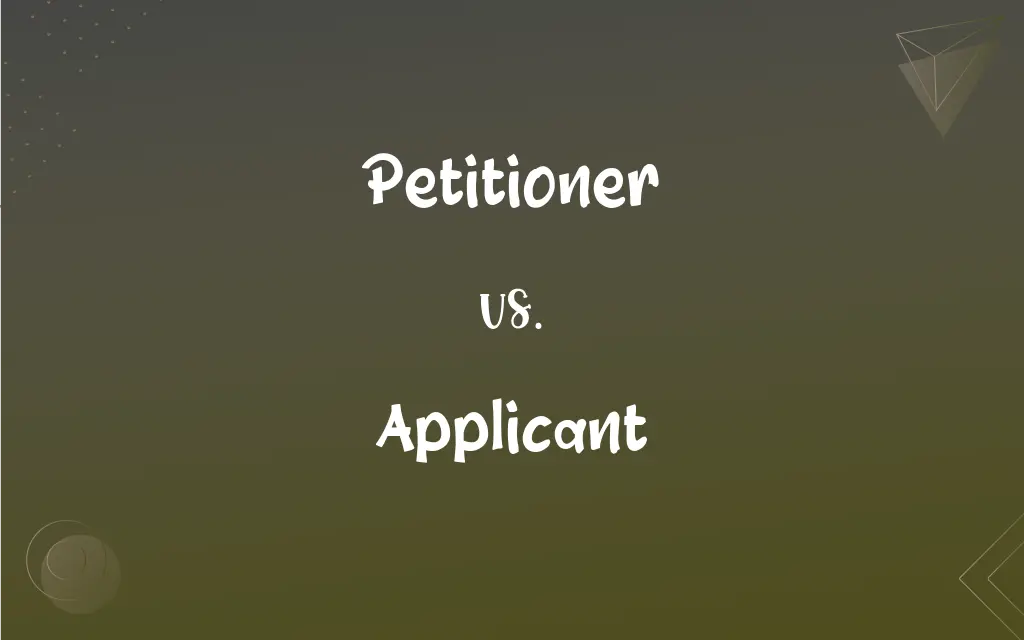Petitioner vs. Applicant: What's the Difference?
Edited by Janet White || By Harlon Moss || Updated on November 7, 2023
A petitioner seeks legal or formal action, while an applicant requests entry, position, or consideration.

Key Differences
"Petitioner" is a term commonly used in legal contexts to refer to an individual who presents a petition to a court or a person with authority, seeking a specific legal remedy or action. The word implies a formal request within a judicial framework, like a petitioner filing for divorce. An "applicant," however, is someone who applies for something, typically a job, school admission, or a grant, which involves a process of evaluation or competition, such as an applicant submitting their resume for a job opening.
In the realm of law, a petitioner is directly involved in the legal proceedings, often initiating a case or appeal in court. For instance, a petitioner might seek the enforcement of a right or the redress of a grievance. An applicant, in contrast, might not be engaged in a legal process but instead seeks to gain entry, position, or acceptance, like a student applying to college where the decision is made based on set criteria and qualifications.
"Petitioner" carries with it a sense of formality and urgency, as it is typically associated with a plea or request that requires immediate attention or a decision from a higher authority. The petitioner is actively seeking a change or a decision, such as a petitioner in a lawsuit requesting a court order. An "applicant" might be in a less urgent situation, aiming to be chosen or considered for an opportunity, like an applicant waiting for approval for a loan or a license.
The role of a petitioner usually involves a legal standing or an entitlement to request a legal judgment. For example, a petitioner might claim a legal right has been violated and therefore petitions a court for justice. An applicant, on the other hand, may not have any prior standing or rights regarding their application; they are simply hoping to be selected based on their qualifications or the merits of their application, like an applicant for a scholarship presenting their academic achievements.
A petitioner's request is often a singular action directed at a specific outcome, such as a petitioner asking for a specific court order. The term suggests a one-way request from an individual to an authority. Conversely, an applicant is typically part of a wider selection process and is one of many seeking the same opportunity. For example, numerous applicants might apply for the same position in a company, and each will be evaluated against the others.
ADVERTISEMENT
Comparison Chart
Context
Legal or formal appeals or requests.
Applications for jobs, schools, etc.
Purpose
To seek a legal judgment or remedy.
To obtain a position or acceptance.
Nature of Request
May involve rights or grievances.
Involves qualifications or eligibility.
Implied Relationship
Adversarial or appeal to authority.
Aspirational or competitive.
Typical Process
Judicial or administrative review.
Selection or approval process.
ADVERTISEMENT
Petitioner and Applicant Definitions
Petitioner
One who presents a petition to an authority in respect of a particular cause.
The petitioner approached the court for an injunction.
Applicant
Someone who applies for admission, as to a college.
Each applicant was required to submit their SAT scores.
Petitioner
A person who appeals to a higher authority for a cause or redress.
The petitioner asked the council for a reassessment of property taxes.
Applicant
A person who makes a formal application for something, typically a job.
The applicant impressed the interviewers with her experience.
Petitioner
An individual who seeks or requests something formally.
The petitioner submitted his plea for asylum.
Applicant
A candidate for a grant or scholarship.
The applicant for the research grant presented a compelling proposal.
Petitioner
A claimant in a legal case seeking a court's intervention.
The petitioner filed a lawsuit for the breach of contract.
Applicant
An individual requesting a service or right.
The passport office was crowded with applicants.
Petitioner
Someone who advocates for legal changes or remedies.
Environmental activists acted as petitioners against the new industrial project.
Applicant
A person who seeks qualification or registration.
The applicant passed the bar exam and became a registered attorney.
Petitioner
A solemn supplication or request, especially to a superior authority; an entreaty.
Applicant
One that applies, as for a job.
Petitioner
A formal written document requesting a right or benefit from a person or group in authority.
FAQs
What is an applicant?
An applicant is a person who requests to be considered for a position, status, or resource.
What is a petitioner?
A petitioner is someone who formally requests a legal action or remedy in a court of law.
What does a petitioner seek?
A petitioner seeks a formal decision or action from a court or authority.
Can the term petitioner be used outside of a legal context?
While it's most common in legal settings, it can sometimes be used for someone who petitions in a non-legal context.
Is an applicant always applying for a job?
No, applicants can apply for various things, such as school admission, loans, or permits.
Do petitioners need to submit supporting documents?
Yes, petitioners usually need to provide evidence or documentation to support their petition.
Does a petitioner need a lawyer?
In many cases, especially in formal legal settings, a petitioner may need a lawyer.
What does an applicant seek?
An applicant seeks selection or approval for a position, service, or right.
Is a petitioner’s request always legal in nature?
Yes, it typically involves a request for a legal judgment or decree.
Are applicants part of a competitive process?
Often, yes, applicants usually compete with others for limited positions or resources.
Is there a fee to be a petitioner?
In many courts, there are filing fees associated with submitting a petition.
What documents might an applicant need?
An applicant might need resumes, letters of recommendation, or proof of qualifications.
Can an applicant be an entity other than an individual, like a business?
Yes, businesses can apply for permits, licenses, and other official needs.
What is the outcome for an applicant?
The outcome is either acceptance, rejection, or placement on a waiting list.
Can anyone be an applicant?
Yes, anyone can be an applicant as long as they meet the criteria for what they are applying for.
Can the role of a petitioner be performed by a corporation?
Yes, corporations can act as petitioners through representatives in legal matters.
What is the outcome for a petitioner?
The outcome is a legal decision or relief granted or denied by an authority.
Is there a fee to be an applicant?
Sometimes, especially for applications to educational institutions or certain certifications.
How specific is a petitioner’s request?
A petitioner’s request is usually very specific, seeking a particular legal resolution.
Do applicants need to specify the role or item they’re applying for?
Yes, clarity about the position or resource is necessary in the application process.
About Author
Written by
Harlon MossHarlon is a seasoned quality moderator and accomplished content writer for Difference Wiki. An alumnus of the prestigious University of California, he earned his degree in Computer Science. Leveraging his academic background, Harlon brings a meticulous and informed perspective to his work, ensuring content accuracy and excellence.
Edited by
Janet WhiteJanet White has been an esteemed writer and blogger for Difference Wiki. Holding a Master's degree in Science and Medical Journalism from the prestigious Boston University, she has consistently demonstrated her expertise and passion for her field. When she's not immersed in her work, Janet relishes her time exercising, delving into a good book, and cherishing moments with friends and family.































































